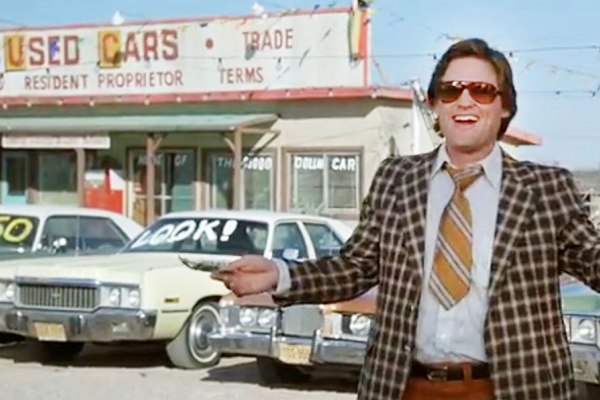
The Easiest Job
Hands down, the easiest job in any company that produces software for on-premises delivery is the sales job.
Everything is magically aligned to make this job “easy” on a relative basis.
- The more a producing company promises, the more the purchasing company wants.
- The more the customer wants, the larger the contract becomes. If the software doesn’t do it today, the producing company adds in professional services fees to customize the software.
- The more you promise, the higher the probability of closing a deal.
In many ways, being an on-premises software salesperson is very much like being a new car dealer. The dealer (or software producer) has several new cars on the lot that the customer can just drive away in today. If the customer wants something special, the dealer can very likely configure it and order it from the factory – the customer just needs to wait awhile. These options cost a bit more and take a bit longer to produce.
Leather seats? Sure – we have that. Different color? We have 25 colors from which to choose. Finally, if the customer’s desire is far afield from what the factory can fulfil (special paint effects, spoilers, ground effect lighting, etc.), the dealership either has an auto shop that can fulfil the request, or a relationship with an auto shop somewhere in town from which the dealer receives a referral fee.
Sure, your software product still must compete well with the other providers in your space just as Chevy’s products must compete well with Ford, Dodge, Toyota, etc. But assuming you have a viable product, meeting a customer’s needs is not very difficult (for the salesperson) and the more the customer wants the more the company (and the salesperson) makes!
That’s not to say that just anyone can be a salesperson or that the sales job is “easy” (remember – we used relative terms like easiest and easier). We know that not all of us get excited about hitting the road every day, living on planes and in hotels, and putting a smile on in front of people we barely know.
We’re just saying that on a comparative basis, it’s easier than most other jobs in the company (engineering, product management, finance, etc.) and a whole lot easier than the alternative job in software sales.
The Hardest Job

Kurt Russell, Used Cars (1980)
Contrast the on-premises software sales job with what is very likely the hardest job in the software industry – that of the Software as a Service (SaaS) salesperson. The root of this difference in difficulty, lies within the principles necessary for SaaS to be successful – specifically building to market need instead of customer want.
Whereas on-premises sales are bolstered by adding the entirety of a customer’s wants into a contract (thereby increasing the value of each contract), such a process creates bloated and unmaintainable SaaS solutions. To be successful in a SaaS world, we need configuration over customization and homogeneous environments.
To that end, successful SaaS salespeople have a job that’s very similar to that of a used car salesperson. I know, the metaphor conjures up cheap, rumpled suits and people who wreak of desperation. But consider the job for a minute – it is quite difficult. The used car salesperson needs to converge customer wants into something that he or she has on the lot or there isn’t going to be a sale.
There is no factory from which to order specific configurations. The dealership isn’t likely to have an after-market shop for bespoke requests. The salesperson must be a bit of a magician in somehow force fitting a laundry list of customer desires into some vehicle that’s sitting on the lot.
I’ll say that again – the used car salesperson can only sell what’s on the lot. This is similarly true with SaaS salespeople – they need to find a way to convince a customer that their wants are served by a product’s existing capabilities.
Mature SaaS products evolve into having a great deal of customer configurable items that allow for incredible extensibility. But those configurations don’t typically exist in early stage companies. Even more mature SaaS solutions implement APIs that allow for off-platform extensions of product capabilities.
Does your customer want a unique workflow engine? A mature solution allows for the current workflow to be turned off and for another workflow to be plugged into the system using APIs.
Does your customer want to use a different order fulfillment solution? A mature solution allows for the warehouse management component to be disabled and replaced via asynchronous stubs and APIs to another providers fulfillment services. Once API extensions are available, professional services teams can again begin to create revenue streams from customer wants.
The key point remains that sales teams in SaaS solutions cannot go “off script”. They must only sell what’s “on the truck” or “on the lot”.
Allowing SaaS sales teams to behave in the same fashion as on-premises sales teams will cause:
- High levels of customer dissatisfaction when products can’t be delivered
- High churn and slow time to market in the engineering organization
- Incredible “whiplash” in product management (rapid change of priorities)
- Soaring software maintenance costs for the company as revisions “in the wild” increase relative to other SaaS firms.
- High costs of goods sold as infrastructure costs rise to meet the needs of product skew and code complexity
All of these will combine to make the company, over time, under perform relative to competitors. Ultimately the company's SaaS solution will become bloated, noncompetitive and the company's SaaS solution will fail.
This change in selling behavior is so significant that we often find on-premises sales organizations incapable of making the transition to the SaaS mentality and necessary way of selling. Many companies with which we work go through a cycle of trying to retain their original sales force, seeing that the organization's behaviors are inconsistent with need too late as product time to market slows and margins decline, and then replacing large portions of the sales team late in the game.
AKF Partners helps companies transition to a SaaS model and mindset. Give us a call – we can help!